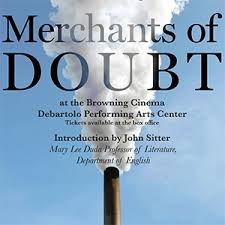by Roger I. Roots
Remember that book, and later movie, entitled “Merchants of Doubt”? It told how the world’s oil, gas and coal giants were secretly funding a “climate denial” movement in order to confuse and mislead the world into questioning the settled, unequivocal, unchallengeable science of catastrophic manmade climate change.
It turns out that the entire notion was groundless. The New York Attorney General’s office, subsidized by millions of dollars from the Rockefeller trusts and Michael Bloomberg, after examining 4 million pages of documents in a 3-year investigation, could not make a case. Exxon’s (and Mobil’s) treatment of climate science has largely tracked that of the rest of the world. Corporate management made decisions years ago to adapt to “mainstream” messaging on the issue, and to prepare for a more CO2-regulatory future.
The NYAG, doubtlessly exhausted after investigating ExxonMobil for 3 years, finally filed a scaled down version of the case everyone was waiting for in October 2018. The complaint—some 93 pages long—is merely that ExxonMobil’s projected costs-per-ton-of-carbon “proxies” described in some of the company’s glossy reports did not accurately reflect the company’s internal assessments of its own petroleum assets. As such the allegation is a securities fraud case; sort of. (This downsized “Exxon knew” allegation doesn’t meet one of the most important elements of traditional securities fraud —proof of intent—so the case is being brought under New York’s Martin Act, which requires only proof of negligence.)
Watching the trial play out last week in the New York Supreme Court courtroom of Judge Barry Ostrager, one couldn’t help but sense that the case is surreal. Here were ExxonMobil officials testifying about their desire for uniform global carbon taxes and regulations, their support for the Copenhagen and Paris climate agreements and their disappointment in the world’s failure to ‘do something’ about climate change.
Also testifying in the trial were representatives of very left-leaning, “socially conscious” investment funds who claim to believe the world is speeding toward imminent climate apocalypse but who simultaneously hold onto their ExxonMobil stock because of its reliability for steady growth and profits. Belief in the climate change doomsday scenario necessarily includes an understanding that Exxon and other fossil fuel interests will soon see their fortunes crater to virtually nothing as the apocalypse nears. But there are immense institutional investors such as CalPERS (California’s employee pension funds) and the New York City pension funds holding millions of dollars in ExxonMobil stock who claim to simultaneously support the theory.
These institutional investors forced ExxonMobil to issue a report in 2014 explaining how the corporation intended to address the threat of future climate change. Exxon produced several glossy reports with color-coded maps indicating that the company was prepared to pay as much as $80 per ton of carbon due to regulations in some countries by the year 2040.
The NYAG now claims those color-coded maps constituted securities fraud. Attorneys for the State of New York are now pointing to other, internal, Exxon documents which gave differing costs-per-ton estimates for 2040. (ExxonMobil defends by arguing that the differing sets of figures are apples and oranges; that some represent future demand estimates while others represent future cost estimates.)


